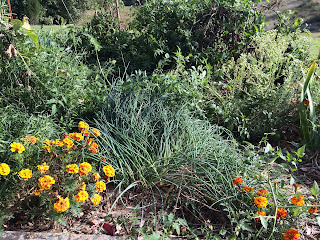Saturday, January 14, 2023
Self-seeding plants are ones that drop seeds that sprout into more plants. There are many herbs, veggies and flowers that are good at self-sowing. You gotta love planting once and getting self perpetuating crops. The biggest watch out with self-seeders is that they are not too aggressive at spreading!
There are a few edibles and flowers that I don't worry about planting any longer because I can count on them to be back next spring.
For salad greens, there are many self seeders in my edible garden: sorrel, arugula, mustard greens, lettuce, sprouting broccoli, Chinese multicolor amaranth and Red Malabar spinach.
Sorrel and arugula are perennials and self-seeders. Sorrel has a Granny Smith apple taste in the cool months and becomes more bitter in the summer. Arugula has a peppery taste in cool months and much stronger in the hot summer months.
Mustard greens are an annual and self seeds. It has a more peppery taste than sorrel. More mild in the cool months and biting in summer months. There are mustard varieties available now that are very mild all the way through summer.
If you harvest just the outside leaves of lettuce plants, lettuce plants will "bolt" when the temperatures stay in the 80's consistently, sending up a flower stalk. If you leave the flowers to bloom and make seed, you will get volunteer lettuce plants in your garden. I dig up the plants and replant them where I want them to mature. They don't produce tons of seedlings and I eat lots of salads so I do supplement the volunteers with transplants and seedlings.
Sprouting broccoli and Chinese multicolor amaranth self seed regularly in my garden. The leaves stay mild all through summer and sprouting broccoli leaves taste like broccoli. In June, sprouting broccoli produce individual broccoli florets that are also great for salads.
The last salad green that is a solid self-seeder in my garden is Red Malabar spinach. It loves the heat of summer, produces a beautiful maroon vine and flowers. The leaves stay sweet all the way through fall. I brought one pot inside this fall and it is still doing well indoors. The leaves taste similar to spinach but is thicker than spinach leaves.
Herbs that self sow in my garden are garlic chives, mountain mint, dill, basil, parsley, celery, cilantro, and horseradish. Mint will also spread invasively in the garden if left in a bed. I grow mint only in pots to keep the runners from spreading. I have had years that garlic chives, cilantro, and dill have self sown more than I would like! Mountain mint, horseradish and celery are always prolific. I have to do thinning every spring from all their volunteers. For basil, I usually get one or two Genovese and Cardinal volunteers and lots of Nuun basil volunteers. I and the bees love basil so I am happy to see them come back each year. I do grow additional Genovese and Cardinal from seed. I love the Cardinal basil flowers and scent and use the Genovese for making pesto so like to have many of each in the garden.
The self sowing veggies I grow are Egyptian walking onions, carrots and tomatillos. Egyptian walking onions put on bulbets at the top of their green stalks that fall over and replant themselves. Their underground bulbs also divide and create more onions. Carrots only self-sow if you allow them to go to seed and not pull all you have planted to eat. They send up a flower that looks like Queen Ann's Lace. The two are in the same family. Tomatillos will self-sow easily from any husks that you don't harvest. The bushy plants seem to hide fallen husks so you get volunteers.
Ground cherry is closely related to tomatillos so the same applies to them. Their fruit is smaller and the variety I grow has a yellow colored fruit. Both are in the nightshade family so love summer weather.
Last category of self-seeders in our garden are flowers. Marigolds, Love Lies Bleeding amaranth and Cock's Comb all self-sow enough that if I am patient, I have plenty of seedlings for all I need. I usually can't wait for the marigolds and also buy a few to get a jump start on their flowers. All of these flowers are edible. The Cock's Comb and amaranth leaves make good salad greens as well. The leaves don't become bitter in hot weather either.
There are other edibles that will self seed if fruit falls like tomatoes, squash, and cucumbers. If you are growing hybrids, the babies can be markedly different than the parent. Squash can cross pollinate giving you a different fruit than either of the parents. This can be a fun surprise. Just make sure that any volunteers from this group did not come from a plant with a disease like powdery mildew or blight. If in doubt, pull it out.

No comments:
Post a Comment